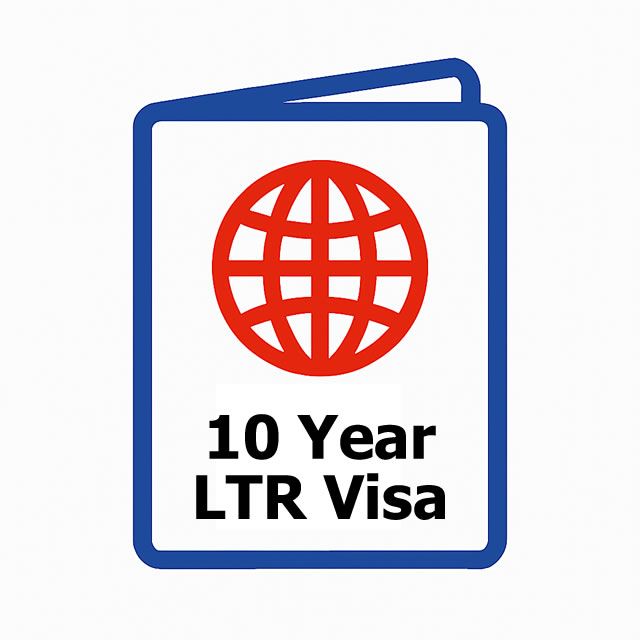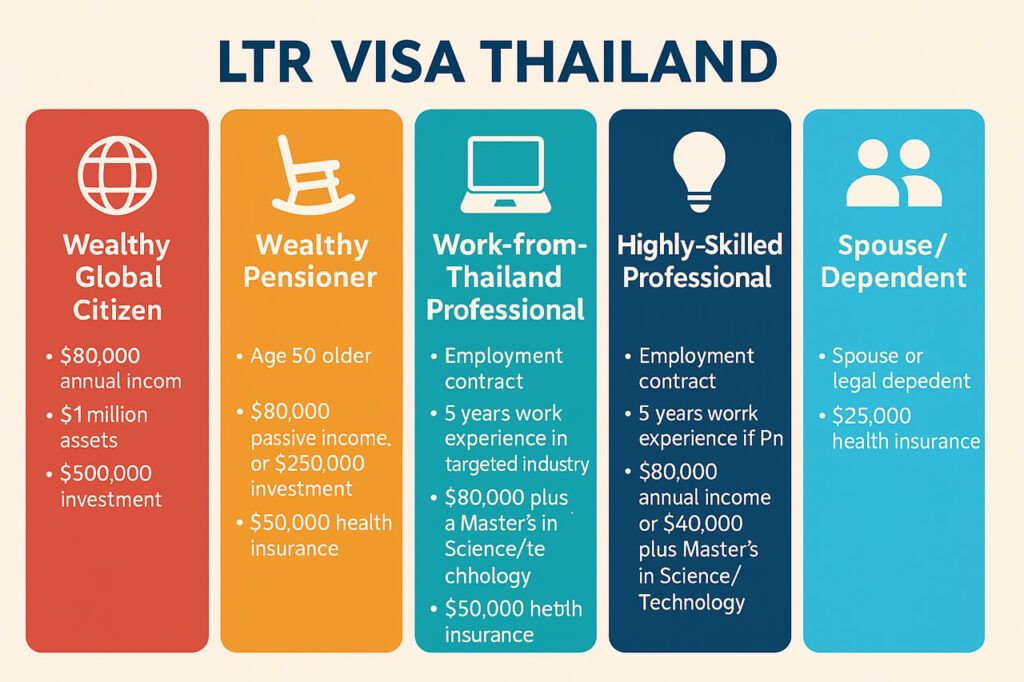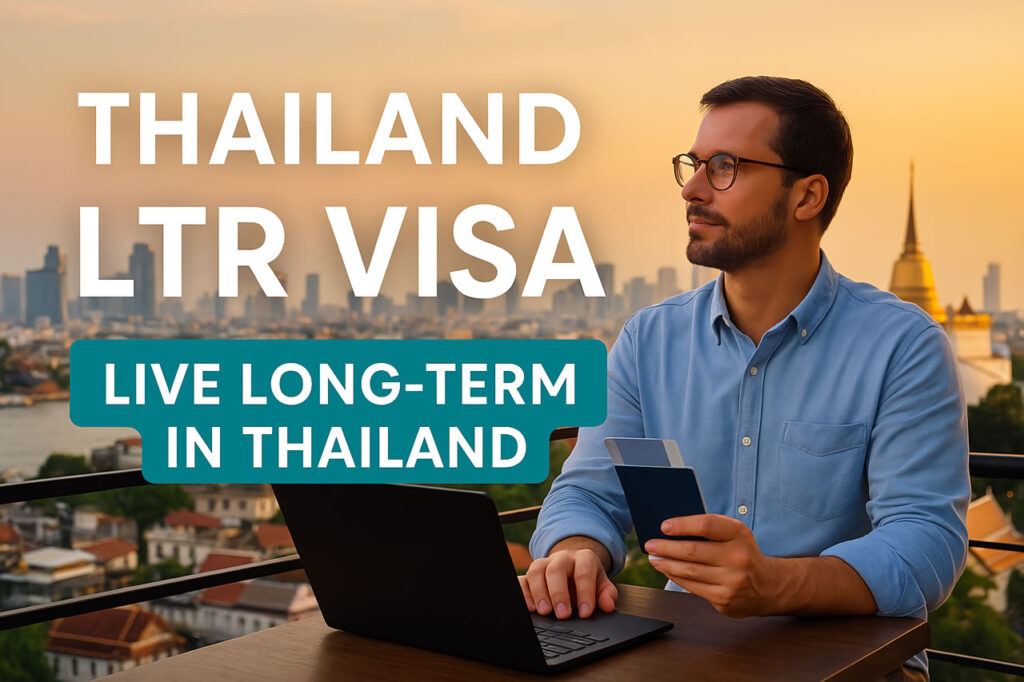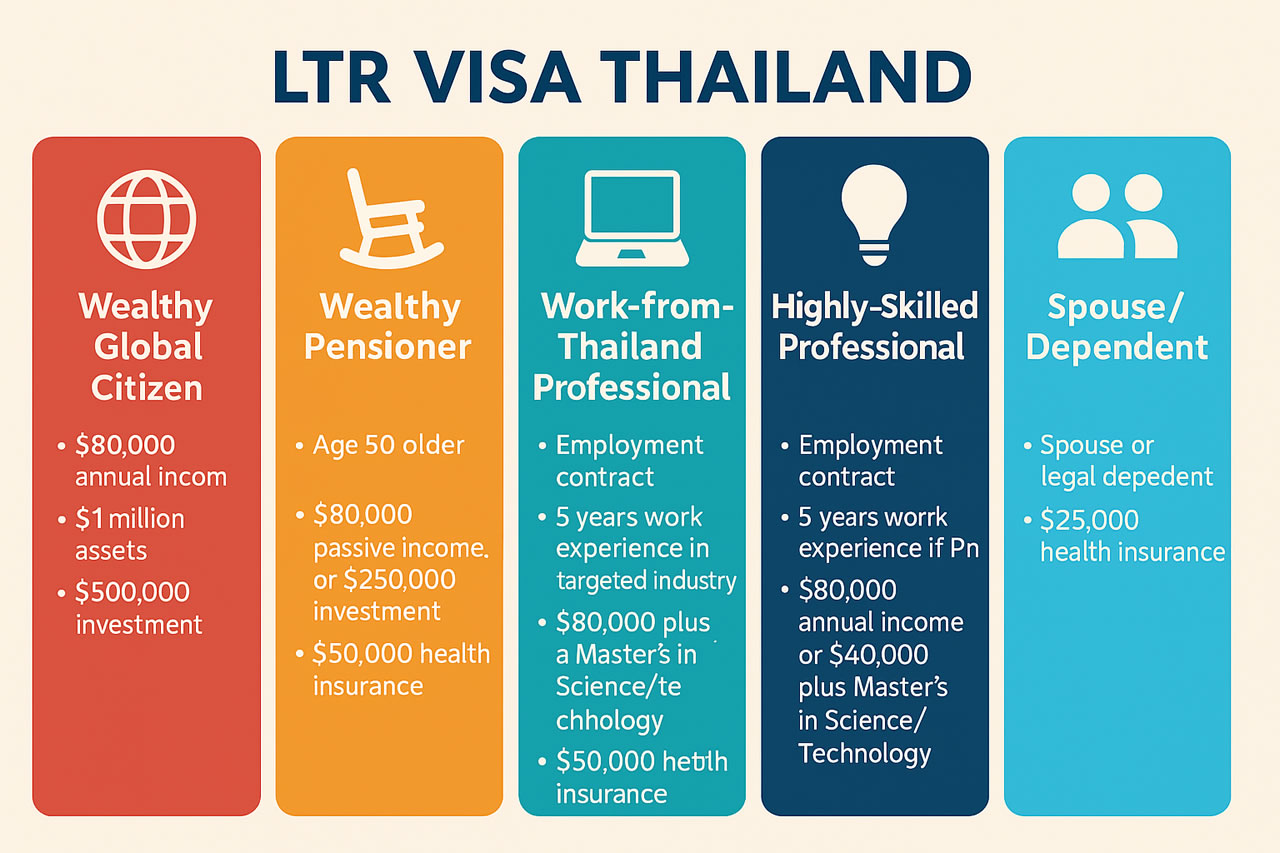
Thailand’s Long-Term Resident (LTR) Visa
- Establish Long-Term Residence with Confidence
- Work Legally with a Thai Work Permit
- Multiple Entries, No Re-Entry Permit Required
- Fast-Track Immigration at major Thai airports
- Skip 90-day reports and report just once a year
If you’re planning to stay in Thailand long term — whether to retire, invest, work remotely, or use your professional skills — the Long-Term Resident (LTR) Visa is one of the most attractive options available. Launched by the Thai government to draw in skilled professionals, wealthy individuals, and remote workers, the LTR Visa offers a range of benefits that go well beyond a standard visa. From longer stays and fewer reporting requirements to tax perks and work permit eligibility, it’s designed to make settling in Thailand easier and more rewarding.
In this guide, I’ll walk you through who’s eligible, what each visa stream requires, how the application works, and what to expect after approval — so you can decide if the LTR Visa is right for you.
What Is the LTR Visa?
The Long-Term Resident (LTR) Visa is a 10-year visa introduced by the Thai government to attract what they call “high-potential foreigners.” These are people who can contribute to Thailand’s economy through investment, innovation, or specialized skills — as well as retirees with strong financial backing or remote workers looking to base themselves in Thailand.
Unlike traditional visa options, the LTR Visa is handled by the Thailand Board of Investment (BOI) rather than Thai Immigration. That’s because this visa is tied to economic development goals, making it quite different in both process and perks.
Key Features of the LTR Visa:
- Valid for 10 years (initial 5-year stay + 5-year renewal)
- Multiple-entry visa — no re-entry permit needed
- Annual immigration reporting instead of every 90 days
- Eligible for a digital work permit (depending on visa category)
- Tax benefits for qualified professionals (potential flat 17% rate)
- Fast-track service at major Thai airports
- Work rights for dependents (with proper permits)
- Recognizes same-sex spouses and legal dependents
The LTR Visa is designed to be more flexible and more beneficial than most other long-stay options — but it also has stricter eligibility requirements.
Who Is the LTR Visa For?
The LTR Visa isn’t a one-size-fits-all option — it’s divided into five main categories, or “streams,” each tailored to different types of foreigners looking to live in Thailand long term. Whether you’re an investor, a retiree, a remote worker, or a professional with specialized skills, there’s likely a stream that fits your situation. Here’s a quick overview:
1. Wealthy Global Citizens
For high-net-worth individuals who want to live in Thailand and are willing to invest in the local economy.
2. Wealthy Pensioners
Ideal for retirees aged 50+ with strong passive income, such as pensions or investment returns.
3. Work-from-Thailand Professionals
Targeted at remote workers and digital nomads employed by foreign companies who want to base themselves in Thailand.
4. Highly-Skilled Professionals
Designed for experts in key industries who are employed (or planning to be employed) by Thai companies or institutions.
5. Spouses and Dependents
Allows family members — including legal spouses, children, and even parents — to live in Thailand under the same program.
Each category has its own set of requirements, especially when it comes to income, investments, and health insurance. In the next section, we’ll look at those details one by one.
LTR Visa Eligibility and Requirements by Category
To apply for the LTR Visa, you need to fall into one of five approved categories. Each has different criteria, and the bar for eligibility is relatively high. Below, I’ll walk you through each stream in detail — who it’s for, what the requirements are, and a few things to watch out for.
1. Wealthy Global Citizens
This category targets high-net-worth individuals who aren’t planning to work in Thailand. It’s ideal for those with substantial assets and investment capital — people looking to enjoy Thailand’s lifestyle while contributing economically through investment.
Requirements in detail:
- Assets of $1 million USD+: These can be held globally — real estate, bank deposits, stocks, etc. You’ll need documentation to prove the total value.
- Investment of $500,000 USD+ in Thailand: This can go into:
- Thai government bonds (low risk)
- Foreign direct investment (FDI) into Thai businesses
- Real estate, such as condo purchases (must meet legal ownership requirements for foreigners)
- Annual income of $80,000 USD or more for the two years before applying
- Health coverage: You’ll need Thai or international insurance with at least $50,000 in coverage. If you don’t have that, a bank statement showing $100,000 held for 12+ months works as an alternative.
If your assets are diversified, this is one of the more flexible streams — especially if you want to combine a Thai investment with a long-term residence.
2. Wealthy Pensioners
This is designed for retirees aged 50 and over who want to enjoy their retirement in Thailand. If you’re receiving a good pension or living off investment income, this might be your best option.
Requirements in detail:
- Must be 50 years or older
- Passive income of $80,000/year — includes:
- Government or private pensions
- Rental income
- Dividends or interest payments
- Capital gains from investments
- If your income is between $40,000–$79,999/year, you can still qualify by investing $250,000 USD in Thai bonds, FDI, or property
- Health insurance covering $50,000 (or $100,000 in savings held for at least 12 months)
Important note: You cannot use active employment income here — the money must come from passive sources. This stream is more accessible than it seems — many retirees with a combination of pension and investments can meet the threshold, especially with the option to invest $250,000 to offset a lower income.
3. Work-from-Thailand Professionals
This is the go-to option for digital nomads and remote workers who are employed by foreign companies but want to live in Thailand full-time. It’s also ideal for remote executives or consultants working with major firms abroad.
Requirements in detail:
- Contract or agreement with a foreign company
- Employer must be a publicly listed company or a private company:
- Operational for at least 3 years
- Combined revenue of $150 million USD+ over the past 3 years
- At least 5 years of work experience in a BOI-targeted industry (within the last 10 years). These include:
- Tech and software development
- Finance and fintech
- Renewable energy
- Healthcare and biotech
- Automotive and robotics
- Annual income of $80,000+ USD for the last 2 years
- Or $40,000+ with either:
- A Master’s degree
- Ownership of valuable intellectual property
- Receipt of Series A funding of $1 million+ (for founders/startup employees)
- Or $40,000+ with either:
- Health insurance ($50,000 coverage) or $100,000 in savings
While the income requirement might seem high, this stream is one of the few official options for legally staying in Thailand as a remote worker. If your employer is large and stable, and you’ve got the credentials, it’s worth considering.
4. Highly-Skilled Professionals
This stream is for foreign experts with specialized skills who are working in Thailand. That includes researchers, engineers, scientists, university professors, and professionals in science and tech fields.
Requirements in detail:
- Must have a job offer or contract with a Thai-based company or organization
- At least 5 years of experience in a relevant industry
- Waived if you have a PhD or work for a Thai government agency
- Income of $80,000+ USD annually
- Or $40,000+ if you have a STEM Master’s degree or relevant technical expertise
- Income requirement is waived for those working in:
- Thai universities
- Research institutions
- Government training or R&D centers
- Health insurance covering $50,000 or $100,000 in bank savings
This stream is generous to academics and researchers — especially those in partnerships with Thai institutions. It’s also ideal if you’re being recruited into sectors where Thailand is actively trying to grow.
5. Spouses and Dependents
This allows the immediate family of LTR Visa holders to join them in Thailand — and enjoy the same long-term stability.
Eligible dependents include:
- Legal spouse, including same-sex marriages (recognized as of October 2024)
- Children under 20 years old
- Parents or other legally dependent family members (documentation required)
Requirements:
- Proof of relationship: marriage certificate, birth certificate, or legal adoption papers
- Health insurance with a minimum of $25,000 USD in coverage
Dependents can also apply for work permits if they meet the requirements. This makes the LTR Visa a good option for expat families planning to settle in Thailand together.
LTR Visa applicants must show health coverage of at least $50,000 — or provide proof of savings. For accepted plans, coverage details, and expert tips, check out our Thailand Health Insurance Guide.

How to Apply for the LTR Visa in Thailand
Applying for the LTR Visa isn’t as straightforward as a tourist or retirement visa — but once you’re approved, the long-term benefits are worth it. The process is handled by the Thailand Board of Investment (BOI), not standard Thai Immigration, which means you’ll be applying through a separate system with its own rules and requirements. Here’s a step-by-step look at how it works:
1. Choose Your Visa Category
Before anything else, you’ll need to determine which of the five visa streams you’re applying under. Each category has specific financial, professional, or investment requirements — so take time to review the eligibility criteria and gather the right documentation.
2. Prepare Your Documents
This is where things get detailed. You’ll need to provide documents that prove your eligibility — and each stream requires slightly different evidence. Depending on your category, this might include:
- Passport copy
- Employment contract or service agreement
- Proof of income (tax returns, pay slips, pension statements)
- Proof of investments or assets
- Health insurance certificate
- Academic qualifications (degrees, certifications)
- Relationship certificates (for dependents)
All documents not in Thai or English must be translated and, in some cases, legalized or notarized. Double-check everything — missing or inconsistent documents are a common cause of delays.
3. Submit Your Application Online
Once everything’s in order, register and submit your application through the BOI’s official LTR Visa portal: 🌐 ltr.boi.go.th. You’ll be asked to upload all documents and fill out a detailed form. After submission, your application will enter a pre-screening process by the BOI.
4. Wait for Processing (4–8 Weeks or More)
The review process typically takes 4 to 8 weeks, but it can take longer if documents are unclear, incomplete, or if the BOI requests further information. If there are issues, the BOI will contact you for clarification or to upload additional documents. Be prompt and thorough in your responses to avoid further delays.
5. Visa Issuance
Once your application is approved, you’ll receive confirmation from the BOI. From there:
- If applying from outside Thailand, you’ll collect your visa from your local Thai embassy or consulate.
- If already in Thailand, you’ll receive instructions on visiting BOI offices or designated immigration centers to get your visa affixed.
You’ll also need to pay the visa fee — currently 50,000 THB (around USD $1,400), which covers the full 10-year validity.
6. Optional: Apply for a Digital Work Permit
If your visa stream allows you to work in Thailand, you can also apply for a digital work permit through the BOI system. Once submitted, you don’t have to wait — you’re legally allowed to start working immediately while the permit is being processed.
What to Know After You Receive Your LTR Visa
Once you’ve secured your Long-Term Resident Visa, you’re not completely off the hook — but the good news is that it’s a lot more flexible than most other Thai visas. Here’s what you need to know to stay compliant and make the most of your status in Thailand.
Annual Immigration Reporting (Not Every 90 Days)
One of the biggest perks of the LTR Visa is the reduced reporting requirement. Instead of reporting your address every 90 days like most visa holders, LTR Visa holders only need to check in with Thai Immigration once per year. That annual report can typically be done at your local immigration office or online (depending on your location and current systems in place).
Working in Thailand with an LTR Visa
If you’re in one of the work-eligible streams (like Highly-Skilled Professionals or Work-from-Thailand Professionals), you can legally work in Thailand after applying for a digital work permit.
Here’s how it works:
- You submit your work permit application online through the BOI portal.
- Once submitted, you’re allowed to begin working immediately.
- Your digital work permit will be issued electronically and linked to your visa.
Important: Your work permit becomes invalid if your LTR Visa is canceled or expires, so make sure both remain in good standing.
Dependents Can Work Too (If Eligible)
Dependents — including spouses — can also apply for a work permit if they meet the criteria. This makes the LTR Visa a great option for dual-income expat families looking to build a life in Thailand together.
Travel Freely (No Re-Entry Permit Needed)
Unlike many other long-stay visas in Thailand, the LTR Visa is multiple-entry by default. That means you can leave and re-enter the country as needed — without applying for a re-entry permit each time. Just show your passport with the LTR Visa stamp when returning to Thailand, and you’re good to go. Bonus: LTR Visa holders also get to use fast-track lanes at major Thai airports.

LTR Visa FAQ: Common Questions Answered
Still have questions? You’re not alone. Here are some of the most frequently asked questions about the LTR Visa — along with clear answers to help you navigate the process confidently.
Can I apply for the LTR Visa while I’m already in Thailand?
Yes. If you’re staying in Thailand on another valid visa, you can apply for the LTR Visa and switch your status — as long as you meet all the requirements for your chosen category.
What if my application is rejected?
You can reapply. If your LTR Visa application is denied, you’re allowed to submit a new application once you’ve addressed the issues that caused the rejection. Many people seek legal or visa consulting help the second time around.
Can I buy property in Thailand with the LTR Visa?
Yes and no. Like all foreigners, LTR Visa holders can buy condos and lease land, but cannot directly own land in their own name. You can also enter long-term lease agreements or invest in property developments legally.
Do LTR Visa holders get a work permit automatically?
Not automatically. You still need to apply for a digital work permit through the BOI, but the process is faster and more streamlined compared to regular work permit procedures. You can begin working as soon as the application is submitted.
How is the LTR Visa different from the Thailand Elite Visa?
- LTR Visa: For professionals, investors, and skilled expats who may want to work or do business in Thailand. Requires proof of income, investment, or employment.
- Thailand Privilege Visa (Thailand Elite): A long-stay tourist visa with luxury perks, airport services, and long-term stays (5–20 years) — but does not allow employment.
Do I need to be employed before I apply?
Only if you’re applying under a work-related category — such as Work-from-Thailand Professionals or Highly-Skilled Professionals. If you’re a retiree or investor, employment is not required.
Do social security or government pensions count as income?
Yes. These are considered passive income and can be used to meet the financial requirement under the Wealthy Pensioners stream. If the amount isn’t enough, you can combine it with investment income or savings.
Are same-sex spouses eligible for dependent visas?
Yes. As of October 2024, Thailand recognizes same-sex marriages, and legal spouses of any gender are eligible for the LTR Visa as dependents.
Is the LTR Visa Right for You?
Thailand’s Long-Term Resident (LTR) Visa is one of the most forward-thinking immigration options the country has ever introduced. It’s not for everyone — the financial and professional requirements are strict — but for those who qualify, it offers a level of convenience, security, and freedom that few other visas can match. Whether you’re a retiree looking for peace of mind, a digital nomad wanting to stay longer without visa runs, or a highly-skilled professional planning to build a life here, the LTR Visa is worth serious consideration.
And with benefits like multiple-entry privileges, reduced reporting requirements, fast-track immigration lanes, and eligibility for work permits — it’s a strong step forward in making Thailand more accessible to long-term residents. If you’re still unsure which category fits you best or want help preparing your application, consider speaking with a visa consultant or legal advisor familiar with BOI procedures. It’s a detailed process, but with the right preparation, the path to long-term life in Thailand can be surprisingly smooth.
| 📌 Looking for more visa help? |
|---|
| ✅ Thailand Visa Hub – Your central guide to all visa types, rules, and long-term options. |
| ✅ Visa Finder Tool – Answer a few quick questions and see which visa best fits your situation. |
| ✅ Visa Stay Calculator – Check expiry dates, 90-day reports, and plan visa runs with ease. |

